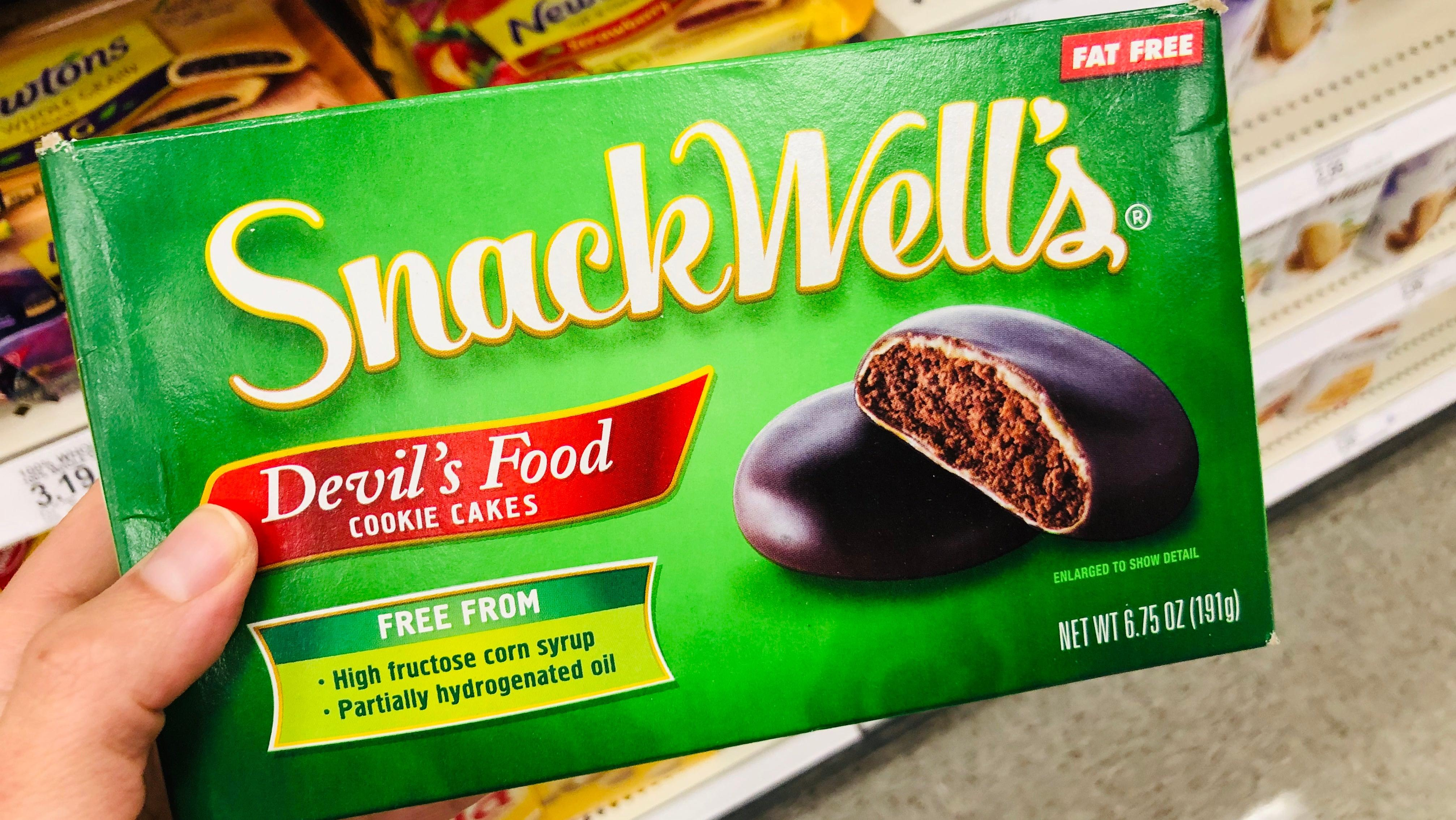Good Riddance, SnackWell's
The diet snack brand quietly folded and we're not mad about it.
The instantly recognizable green packaging that came to define diet culture in the 1990s and early 2000s has quietly disappeared from shelves. The SnackWell's website is now just a goodbye note to customers:
Dear Loyal Snackwell's Customer –
After thirty years of providing your favorite snacks, the Snackwell's brand has been retired.
We appreciate your loyalty and love for the reduced and fat-free snacks that became synonymous with the Snackwell's name.
We encourage you to try a new snacking line created by the Skinnygirl brand which are crafted with less sugar than comparative snacks.
Thank you,
Your friends at Snackwell's
Multiple requests to B&G Foods Inc., the brand's parent company, to clarify exactly why the decision was made went unanswered. But an examination of the low-fat snack's impact on society reveals that we're probably better off without it.
SnackWell’s death rattle
While hunting around for any official announcement of the brand's demise outside of the official website, I discovered that SnackWell's has been out of touch for a while—its social media pages have been inactive since 2018, and the final postings on Facebook were met with a barrage of angry comments. Underneath even the most benign post from SnackWell's, like a post commemorating Earth Day, fans would write things like "these suck," decrying the brand's "new and improved" formula that changed the flavor of the brand's signature item, the Devil's Food Cookie Cakes. Some even called for a boycott:
Been eating your Devil's Food cookies since I was a child (now 66). My question for SnackWell executives is why do any of you still have a job. These "new and improved" cookies taste like garbage. I wouldn't feed this trash to my neighbors hogs. And they'll eat anything. SnackWell must have hired the Coca-Cola executive that thought up the "new Coke" recipe back in the 1980's or so. No SnackWell product will ever find it's way into my shopping cart again. BOYCOTT SNACKWELL'S NOW.
(We must point out that this comment might be facetious, a conclusion drawn in part from the fact that SnackWell's debuted in 1992 and it's therefore impossible for this person to have eaten the cookies as a child.)
The new and improved formula decried by consumers was actually the second recipe change. According to the Chicago Tribune, the first was in 2013 when SnackWell's was acquired by Back to Nature, which took the high fructose corn syrup, artificial flavors, and preservatives out of the Devil's Food Cookie Cakes. In 2017, B&G Foods Inc. took over, The Wall Street Journal reports, and by 2019 the treats were no longer fat free, with the new formula containing 3 grams of fat per serving.
Perhaps the social media pages went dormant because some employee grew tired of replying to every single one of these comments apologizing and delivering the news that the old cookies were never coming back. Whatever the case for the radio silence, it resulted in a tumultuous farewell to the cookie that died as a pale imitation of its former self. As a result, no one seems to have even noticed the brand is gone, let alone begged for its return, as is common with so many other defunct snacks.
According to the Reddit page r/nostalgia, SnackWell's was discontinued at the beginning of 2022 with little fanfare. Some commenters said they assumed the brand was discontinued years ago, others expressed mild sadness mixed with '90s nostalgia, and others still were practically dancing on SnackWell's grave. The cookies leave behind a complicated legacy, the effects of which will be felt in diet culture for a while.
The “SnackWell’s effect” and its lasting impact on society
When SnackWell's hit the scene in 1992, the "in" look was "thin." There was a cultural fixation on how to avoid getting fat at any cost, and SnackWell's low-fat, low-calorie snacks offered a way to do that without denying yourself a treat. The Devil's Food Cookie Cakes in particular became the must-have item of the season because of their delicious taste and promise of "health."
In Eater, Meghan McCarron described the phenomenon thusly: "The cookie cake wasn't bad, exactly, but it was never satisfying: The puck of chocolate cake was oddly airy, the marshmallow was a purely aesthetic line of white, and the chocolate was waxy and sugary, with a firm crunch. It was like eating a chocolate cupcake whose soul had been sucked out."
But this was simply an ineffectual fad diet wrapped in a chocolate coating. The "SnackWell's effect" actually led to people eating more than they normally would because of the "low-fat" label. If it's healthy, it must be okay to eat as much as possible. But "low-fat" and "healthy" are not actually synonymous (in part because the latter term is so slippery), and at the very least, throwing back packs of expensive dietetic cookies did not lead to the weight loss results people were after. For kids like McCarron who grew up with toxic diet culture at the forefront, SnackWell's represents a traumatic era that instilled unhealthy associations with food.
"But that line of thinking [the SnackWell's effect] assumes there is such a thing as good or bad food, or that there's an appropriate amount to eat of something considered bad," McCarron writes. "The fact is, fad diets don't work at all, and sorting food into 'good' and 'bad' categories cuts off access to pleasure."
The framework that SnackWell's introduced is still prevalent today: 100-calorie snack packs, "light" ice cream, hell, even the name of the brand that SnackWell's leaves in its stead, Skinnygirl, perpetuates the fatphobic culture that SnackWell's helped to usher into the 21st century. There's no shortage of low-cal, sugar-free, keto-friendly, "guilt-free," and all-the-other-diet-words-we'd-rather-not-hear-again treats still being hawked out there, all that premium prices. But at least with the loss of SnackWell's, there's one less to worry about. Now that the king is dead, perhaps the rest will fall.
